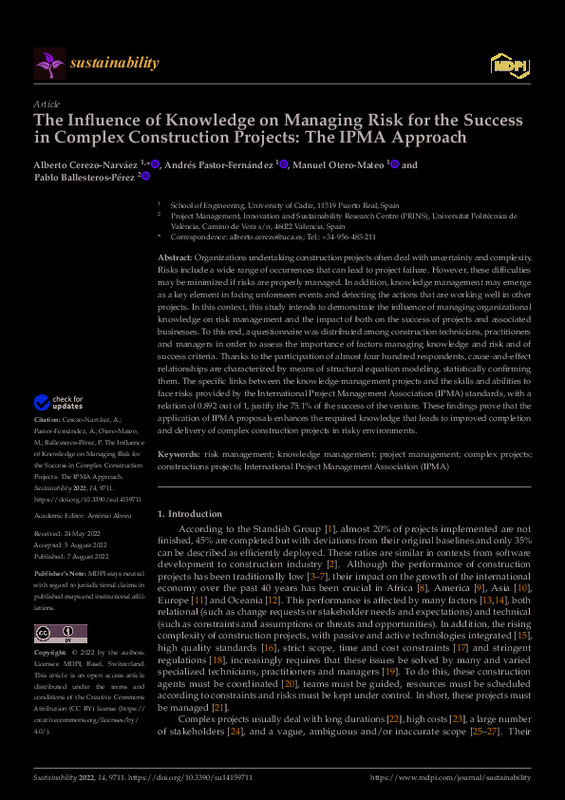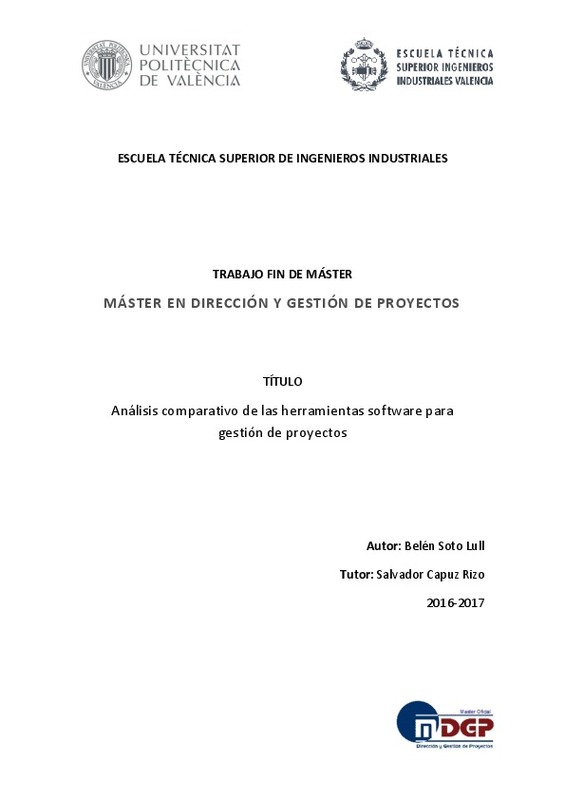JavaScript is disabled for your browser. Some features of this site may not work without it.
Buscar en RiuNet
Listar
Mi cuenta
Estadísticas
Ayuda RiuNet
Admin. UPV
The Influence of Knowledge on Managing Risk for the Success in Complex Construction Projects: The IPMA Approach
Mostrar el registro sencillo del ítem
Ficheros en el ítem
| dc.contributor.author | Cerezo-Narváez, Alberto
|
es_ES |
| dc.contributor.author | Pastor-Fernández, Andrés
|
es_ES |
| dc.contributor.author | Otero-Mateo, Manuel
|
es_ES |
| dc.contributor.author | Ballesteros-Pérez, Pablo
|
es_ES |
| dc.date.accessioned | 2022-11-21T19:01:15Z | |
| dc.date.available | 2022-11-21T19:01:15Z | |
| dc.date.issued | 2022-08 | es_ES |
| dc.identifier.uri | http://hdl.handle.net/10251/190007 | |
| dc.description.abstract | [EN] Organizations undertaking construction projects often deal with uncertainty and complexity. Risks include a wide range of occurrences that can lead to project failure. However, these difficulties may be minimized if risks are properly managed. In addition, knowledge management may emerge as a key element in facing unforeseen events and detecting the actions that are working well in other projects. In this context, this study intends to demonstrate the influence of managing organizational knowledge on risk management and the impact of both on the success of projects and associated businesses. To this end, a questionnaire was distributed among construction technicians, practitioners and managers in order to assess the importance of factors managing knowledge and risk and of success criteria. Thanks to the participation of almost four hundred respondents, cause-and-effect relationships are characterized by means of structural equation modeling, statistically confirming them. The specific links between the knowledge-management projects and the skills and abilities to face risks provided by the International Project Management Association (IPMA) standards, with a relation of 0.892 out of 1, justify the 75.1% of the success of the venture. These findings prove that the application of IPMA proposals enhances the required knowledge that leads to improved completion and delivery of complex construction projects in risky environments. | es_ES |
| dc.description.sponsorship | All authors acknowledge the help received by the research group TEP-955 from the PAIDI (Junta de Andalucia, Spain). | es_ES |
| dc.language | Inglés | es_ES |
| dc.publisher | MDPI AG | es_ES |
| dc.relation.ispartof | Sustainability | es_ES |
| dc.rights | Reconocimiento (by) | es_ES |
| dc.subject | Risk management | es_ES |
| dc.subject | Knowledge management | es_ES |
| dc.subject | Project management | es_ES |
| dc.subject | Complex projects | es_ES |
| dc.subject | Constructions projects | es_ES |
| dc.subject | International Project Management Association (IPMA) | es_ES |
| dc.subject.classification | PROYECTOS DE INGENIERIA | es_ES |
| dc.title | The Influence of Knowledge on Managing Risk for the Success in Complex Construction Projects: The IPMA Approach | es_ES |
| dc.type | Artículo | es_ES |
| dc.identifier.doi | 10.3390/su14159711 | es_ES |
| dc.relation.projectID | info:eu-repo/grantAgreement/Junta de Andalucía//TEP-955/ | es_ES |
| dc.rights.accessRights | Abierto | es_ES |
| dc.contributor.affiliation | Universitat Politècnica de València. Escuela Técnica Superior de Ingenieros Industriales - Escola Tècnica Superior d'Enginyers Industrials | es_ES |
| dc.description.bibliographicCitation | Cerezo-Narváez, A.; Pastor-Fernández, A.; Otero-Mateo, M.; Ballesteros-Pérez, P. (2022). The Influence of Knowledge on Managing Risk for the Success in Complex Construction Projects: The IPMA Approach. Sustainability. 14(15):1-30. https://doi.org/10.3390/su14159711 | es_ES |
| dc.description.accrualMethod | S | es_ES |
| dc.relation.publisherversion | https://doi.org/10.3390/su14159711 | es_ES |
| dc.description.upvformatpinicio | 1 | es_ES |
| dc.description.upvformatpfin | 30 | es_ES |
| dc.type.version | info:eu-repo/semantics/publishedVersion | es_ES |
| dc.description.volume | 14 | es_ES |
| dc.description.issue | 15 | es_ES |
| dc.identifier.eissn | 2071-1050 | es_ES |
| dc.relation.pasarela | S\470157 | es_ES |
| dc.contributor.funder | Junta de Andalucía | es_ES |
| dc.subject.ods | 08.- Fomentar el crecimiento económico sostenido, inclusivo y sostenible, el empleo pleno y productivo, y el trabajo decente para todos | es_ES |
| dc.subject.ods | 11.- Conseguir que las ciudades y los asentamientos humanos sean inclusivos, seguros, resilientes y sostenibles | es_ES |










